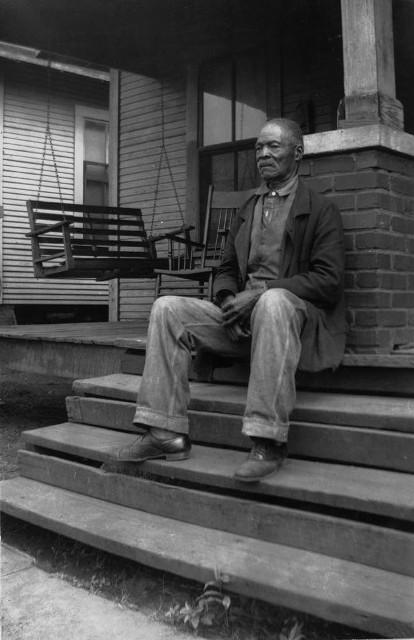
Simon Walker, Birmingham, Alabama
Softly mumbling to himself and gravely shaking a bare, shiny head that had only a fringe of white, closely-kinked wooly hair about the ears, the old Negro shuffled out of the crowded courtroom into the corridor.
Turning clear, quizzical eyes toward a group of white men loitering near the doorway and addressing no one in particular, with a final emphatic shake of his head he said:
"Hit do beat all, de way dese young niggers is allus in trouble wid de law. Now, whin Ah was a young buck de only law mongst us niggers was de word uv ole Massa. Mebbe you all's heerd tell o' him — Cun'l Hugh Walker?
"Ef de Cun'l wasn't de richest man anywhar 'round Forsyth, Georgy, den mah name ain't Simon Walker. Yassuh! Dat's mah name too. Ah belonged to de Cun'l 'long wid more'n er hundderd mo' slaves, an' my mammy an' pappy befo' me belonged to de Walkers.
"All uv 'em gone now — gone to Glory, an dis ole nigger heah all by hisself — de las' one er de fambly. De Cun'l, he had eight boys, an all 'cept de least un jined de Confederits.
"'Twas a turrible sad day when young Maas Chap was brung home wid one of his laigs shot plumb off by de Yankees; an me settin' dar by him a-fannin' erway de flies endurin' all de long hot days whilst he was layin' dar on de aige o' Kingdom Come. An' all de time Ah was thankin' de Lawd dat mah lil' Maas Jim was too young to go to de wawh — (all de Cun'l's sons dey had body servants, an Ah was Maas Jim's boy). Ah useter look atter him, go to school wid him an play in de woods 'tell school was out, an ef he had 'er gone to de wawh, dis nigger would er been right dar wid him.
"Nawsuh, Maas Jim an me never did go to de wawh, but us seed de Yankees whin' Gen'l Sherman come marchin through our plantation. An ef Ah live fur thousand yeahs Ah'd never fergit dat day! Ah ain't nivver seed so many men in one crowd befo' er since, an de las' one uv 'em wearin' de same kind of clo'es. Dey come right up in de yahd, an a passel of 'em tromped right into de Big House, jist lak it was dare'n. Dey turned ebrything wrong side out'ards a-lookin' fer de silver an de jewl'ry, but Ole Missis, she done had news dey was comin' an all de stuff was hid in de woods. Whin dey couldn't fin' de plate an' jewl'ry, dey was hoppin mad, an atter takin' all de hams an rations dey could tote off dey sot fire to de smoke-house, an' de bahn an' all de cotton dat was piled around de ginhouse, to keep de Confederits frum gittin it, dey said. Dey took all de good houses an' mules an' lef' dere ole hongry, broke-down nags dat won't fittin' fer nothin' 'cept fert'lize. But dey didn't hu't nobody, not eben Cookie whin she tuck er broom atter em in de kitchin."

"Ah reckon dem soldiers thought de Cun'l was plumb ruint whin dey lef, but Ah says, Cun'l Walker was er rich man, an' 'fo' long us done bought fresh rations, en drive up de hargs frum de swamp an kilt mo' meat. Den de Cun'l he sont off fer mo' mules, an whin dey come de wu'k went on ergin.
"Come de day whin all de niggers was sot free. Cun'l Walker call all de slaves up to de Big House, an standin dere on de verandah he told 'em dey was now all free niggers — free to go whar dey pleased. But, ef anybody wanted to stay on de plantation to hole up dare hans. Mos' all de hans stayed on de plantation 'tell de Cun'l died, an de fambly sorter broke up. Dat was fo' yeahs atter de Surrender.
"Well, atter dat, Ah jist drifted eroun', an fin'ly landed heah in Bummin'ham in 1888. Wont nothin' much heah den but muddy roads an swamps, but Ah got er job totein' mortar whar dey was buildin' de fust brick sto', an' den er long time atterwards Ah wo'ked fer de 'T.C. and I.' fer twenty-five yeahs.
"But de ole nigger ain't no mo' good fer hahd labor. All dah white folks done gone on, an heah I is on de Welfare, jist waitin' fer de good Lawd to call me up dare fer de Great Reunion — Amen."